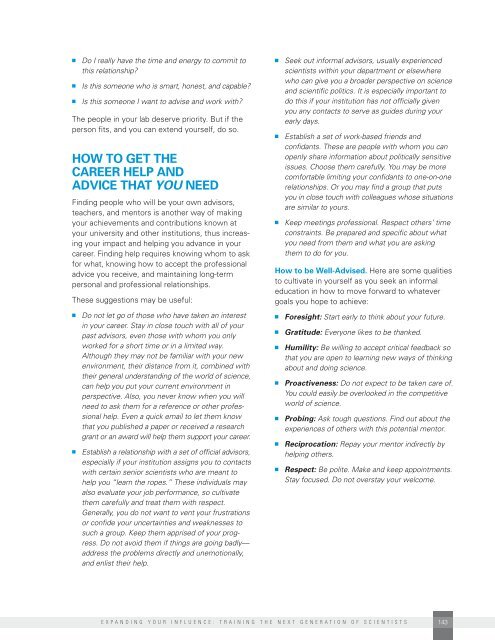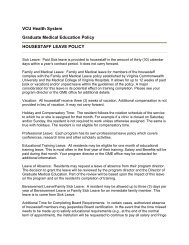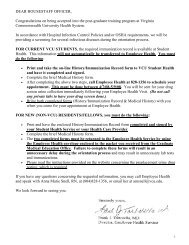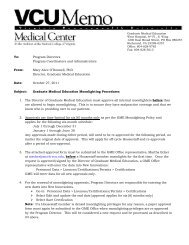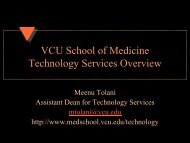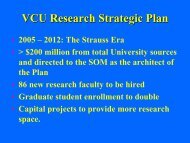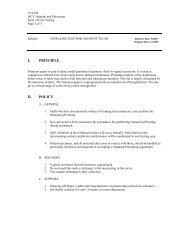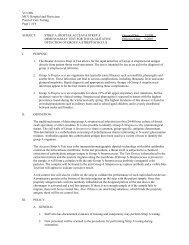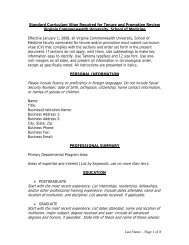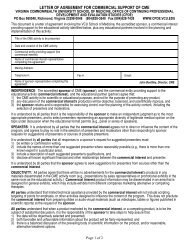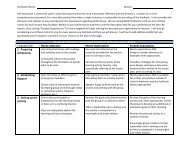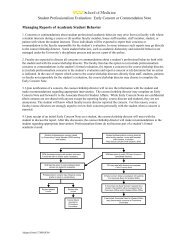It is important to discuss career goals with yourtrainees, especially those more advanced in theirresearch careers. Not all will be interested in along-term competitive career in science. For thosewho are, help them develop a project that willteach them many things and that produces ideas,at least—if not whole projects—that they can useas seeds when they leave your lab and begin toestablish their own labs. After they have gone,keep in touch with them. They will be an increasinglyimportant part <strong>of</strong> your pr<strong>of</strong>essional network.You have a role to play facilitating your trainees’job hunts. Keep alert to job openings, counselthem about the process, coach them on theirinterview presentations, and give them the bestletters <strong>of</strong> recommendation you can. Sometimes,when the search does not go smoothly, you mayneed to keep them in your lab a little longer thanyou expected to, if you are able. Lack <strong>of</strong> continuedfunding for them may make this impossible, butsometimes their well-trained hands can be <strong>of</strong>considerable use to you and it may be to yourbenefit for them to stay. Keep up the words <strong>of</strong>encouragement during this difficult period.Advancing the Careers <strong>of</strong> Physician-Scientists.Physician-scientists have an especially complicatedbalancing act: caring for patients and carrying outexperiments at the bench. As a result, they maynot be able to spend as much uninterrupted timein the lab as their Ph.D. colleagues. However,the strength <strong>of</strong> physician-scientists is that theyhave a clinical base. As someone involved intheir training, you should understand the uniquechallenges physician-scientists face, and youshould value the insights their clinical perspectivecan bring into the lab. Help physician-scientistsin your lab to establish priorities and developeffective time management skills. If you are nota clinician yourself, you might put them in touchwith someone who can help them with thesecompetencies as they apply to the clinical side<strong>of</strong> their responsibilities. In addition, encouragephysician-scientists in your lab to use their clinicalbase. For example, they might enroll patients fromtheir clinic or practice following a simple protocol.They might collect answers to a questionnairewith demographics, or obtain data on clinical presentation,progression and response to therapy, aswell as collect relevant serum or tissue samples.(Adequate ethical permission should be attainedfirst.) Clinical work sometimes allows physicianscientiststo see connections that someone witha basic science background training may miss. Asa researcher, you should take advantage <strong>of</strong> thisperspective by making sure that questions aboutmoving research results into the clinic, or bringingclinical observations back to the bench come up informal and informal discussions in the lab.Working with Technicians. A technician is anemployee who has been hired to get work done,not to advance his or her career. That being said,many technicians are a distinct type <strong>of</strong> pr<strong>of</strong>essionalscientist. You should understand and encouragetheir aspirations. Make it clear to them that theyare valued contributors to your projects. If they areinterested, you may want to give them researchprojects <strong>of</strong> their own. If their aspirations are purelytechnical, encourage them to gain new skills.helping those Outside Your LabWhen you receive a request for significant careerhelp from a young scientist in another lab, oreven in another university, think carefully beforeyou agree. Do not enter into such a relationshipsecretly. Insist that the individual inform his or herdirect supervisor that you two are speaking. Onthe one hand, the request says something positiveabout your standing in the research community,and by taking on a new relationship you mightopen up the possibility <strong>of</strong> future collaborations andincrease the impact <strong>of</strong> your work. On the otherhand, there may be problems you are not aware<strong>of</strong>. Ask yourself the following questions:n Why is this person asking me for help? There maybe a negative reason. In the case <strong>of</strong> a postdoc,perhaps he or she is dissatisfied with relationshipsin the home lab. If this is the case, make sure youare not <strong>of</strong>fending the individual’s supervisor. Youmay find, however, that the supervisor welcomesyour help as an extra resource.n What are the person’s expectations? You need tobe clear about whether you are being asked foroccasional advice or for long-term assistance. If itis the latter, determine whether your role as an advisorwill be formal, involving scheduled contactsand expectations <strong>of</strong> a particular amount <strong>of</strong> yourtime, or informal and confined to occasional conversationsas the trainee’s work moves forward.142 excellence everywhere
n Do I really have the time and energy to commit tothis relationship?n Is this someone who is smart, honest, and capable?n Is this someone I want to advise and work with?The people in your lab deserve priority. But if theperson fits, and you can extend yourself, do so.How to Get theCareer Help andAdvice That You NeedFinding people who will be your own advisors,teachers, and mentors is another way <strong>of</strong> makingyour achievements and contributions known atyour university and other institutions, thus increasingyour impact and helping you advance in yourcareer. Finding help requires knowing whom to askfor what, knowing how to accept the pr<strong>of</strong>essionaladvice you receive, and maintaining long-termpersonal and pr<strong>of</strong>essional relationships.These suggestions may be useful:n Do not let go <strong>of</strong> those who have taken an interestin your career. Stay in close touch with all <strong>of</strong> yourpast advisors, even those with whom you onlyworked for a short time or in a limited way.Although they may not be familiar with your newenvironment, their distance from it, combined withtheir general understanding <strong>of</strong> the world <strong>of</strong> science,can help you put your current environment inperspective. Also, you never know when you willneed to ask them for a reference or other pr<strong>of</strong>essionalhelp. Even a quick email to let them knowthat you published a paper or received a researchgrant or an award will help them support your career.n Establish a relationship with a set <strong>of</strong> <strong>of</strong>ficial advisors,especially if your institution assigns you to contactswith certain senior scientists who are meant tohelp you “learn the ropes.” These individuals mayalso evaluate your job performance, so cultivatethem carefully and treat them with respect.Generally, you do not want to vent your frustrationsor confide your uncertainties and weaknesses tosuch a group. Keep them apprised <strong>of</strong> your progress.Do not avoid them if things are going badly—address the problems directly and unemotionally,and enlist their help.n Seek out informal advisors, usually experiencedscientists within your department or elsewherewho can give you a broader perspective on scienceand scientific politics. It is especially important todo this if your institution has not <strong>of</strong>ficially givenyou any contacts to serve as guides during yourearly days.n Establish a set <strong>of</strong> work-based friends andconfidants. These are people with whom you canopenly share information about politically sensitiveissues. Choose them carefully. You may be morecomfortable limiting your confidants to one-on-onerelationships. Or you may find a group that putsyou in close touch with colleagues whose situationsare similar to yours.n Keep meetings pr<strong>of</strong>essional. Respect others’ timeconstraints. Be prepared and specific about whatyou need from them and what you are askingthem to do for you.How to be Well-Advised. Here are some qualitiesto cultivate in yourself as you seek an informaleducation in how to move forward to whatevergoals you hope to achieve:n Foresight: Start early to think about your future.n Gratitude: Everyone likes to be thanked.n Humility: Be willing to accept critical feedback sothat you are open to learning new ways <strong>of</strong> thinkingabout and doing science.n Proactiveness: Do not expect to be taken care <strong>of</strong>.You could easily be overlooked in the competitiveworld <strong>of</strong> science.n Probing: Ask tough questions. Find out about theexperiences <strong>of</strong> others with this potential mentor.n Reciprocation: Repay your mentor indirectly byhelping others.n Respect: Be polite. Make and keep appointments.Stay focused. Do not overstay your welcome.expanding your influence: training the next generation <strong>of</strong> scientists143
- Page 3 and 4:
A R e s o u r c e f o r S c i e n t
- Page 5 and 6:
Table of ContentsVII119PrefaceChapt
- Page 7:
135 Chapter 10E x p a n d i n g Y o
- Page 15 and 16:
Q u e s t i o nq&aWhat Is a “Tenu
- Page 17:
preparing for immediate submission,
- Page 22 and 23:
Practicing the Talkn Practice your
- Page 24 and 25:
your one-on-one interviews you have
- Page 26 and 27:
If talking directly about money is
- Page 28 and 29:
When the institution responds and y
- Page 30 and 31:
equipment and supplies. Maintenance
- Page 32 and 33:
Q u e s t i o nq&aIs your instituti
- Page 34 and 35:
Working With Human SubjectsWhether
- Page 36 and 37:
RESPONSIBILITIES BEYONDTHE LABORATO
- Page 38 and 39:
UNDERSTANDING YOURINSTITUTION AND H
- Page 40:
Criteria for PromotionStructure of
- Page 45 and 46:
Q u e s t i o nWhat’s in a Name?q
- Page 47 and 48:
Screening ApplicantsWhen you review
- Page 50 and 51:
Interpersonal Skillsn How important
- Page 52 and 53:
Multinational Organizations are hir
- Page 54 and 55:
n If there is an office that handle
- Page 57 and 58:
n Seek funding and publish papers (
- Page 59 and 60:
In fact, even though you yourself h
- Page 61 and 62:
n Craft a statement that you feel c
- Page 63 and 64:
n When you delegate authority to so
- Page 65 and 66:
n Use only pens, preferably with wa
- Page 67 and 68:
Strategy sessionsShould you decide
- Page 69 and 70:
Finding Good Papers for Journal Clu
- Page 71 and 72:
If possible, invite people in your
- Page 73 and 74:
Q u e s t i o nq&aHow do I avoid po
- Page 75 and 76:
The International Committee of Medi
- Page 77 and 78:
Managing Conflictin the LabConflict
- Page 79 and 80:
steps for dealing with conflictWhen
- Page 81 and 82:
chapter 5managing your time“ Succ
- Page 83 and 84:
Check your work: the 90-year though
- Page 85 and 86:
n Make and keep appointments with y
- Page 87 and 88:
n Help them seek advice without tak
- Page 89 and 90:
FAMILY MATTERSMany scientists face
- Page 91 and 92:
chapter 6project management“ We m
- Page 93 and 94:
My project is to get a grant funded
- Page 95:
ObjectivesObjectives are the end re
- Page 98 and 99:
The key events schedule and the act
- Page 100 and 101:
Microsoft Project, a program that s
- Page 102 and 103: Martin, Vivien. Managing Projects i
- Page 104 and 105: appendix II: Example of a Work Brea
- Page 106 and 107: appendix iv: Example of a Gantt Cha
- Page 108 and 109: e h i n d c l o s e d d o o r s :w
- Page 110 and 111: Who might be interested in supporti
- Page 112 and 113: Call your program officerProgram of
- Page 114 and 115: direct costs vs. indirect costsDire
- Page 116 and 117: RESOURCESAllen, Ernest M. “Why ar
- Page 118 and 119: the next generation of students (th
- Page 120 and 121: Seek Feedback through a Formal Peer
- Page 122 and 123: Encouraging Student Questionsn Do n
- Page 124 and 125: Here are some ways you can help the
- Page 126 and 127: n Are there curriculum changes unde
- Page 128 and 129: a relaxed format for talking about
- Page 130 and 131: spend in preparing an effective cou
- Page 132 and 133: The Publishing ProcessTypes of Jour
- Page 134 and 135: A word about impact factorsThe impa
- Page 136 and 137: C r e a t i n g a n i n t e g r a t
- Page 138 and 139: may need to take the first author p
- Page 140 and 141: submitting image filesToday, most i
- Page 142 and 143: Submitting your Paper to Another Jo
- Page 144 and 145: RESOURCESDavis, Martha. Scientific
- Page 146 and 147: increase your impact as a scientist
- Page 148 and 149: Q u e s t i o nq&aHow do I communic
- Page 150 and 151: n Offer criticism and correction in
- Page 154 and 155: When Mentoring,Advisory, or Supervi
- Page 156 and 157: For researchers in developing count
- Page 158 and 159: n Is travel safe and convenient, or
- Page 160 and 161: n The expected contribution of each
- Page 162 and 163: Meetings. Set up systems to ensure
- Page 164 and 165: SPECIAL CHALLENGESFOR THE BEGINNING
- Page 166 and 167: e an important connection to future
- Page 168 and 169: The invention of a new method or pr
- Page 170 and 171: licensee, who can charge others for
- Page 172 and 173: Most profound for developing countr
- Page 174 and 175: Finally, the patents have been chal
- Page 176 and 177: And, India benefited as a supplier
- Page 178 and 179: paperwork involved in purchasing1.
- Page 180 and 181: labeling mattersA case in point: In
- Page 182 and 183: equipment, freeze-drying equipment,
- Page 184 and 185: Responsibilityfor materialsIf an or
- Page 186 and 187: Recent Improvementsin Materials Tra
- Page 188 and 189: “Knowledge is power.” —Sir Fr
- Page 190 and 191: MOUMemorandum of UnderstandingRFPRe
- Page 192 and 193: notes continued182 excellence every
- Page 194: notes continued184 excellence every


